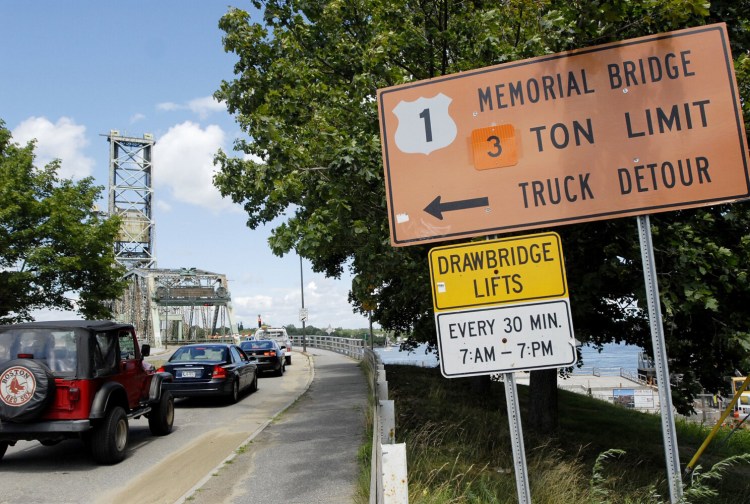July 27, 2011: Transportation officials from Maine and New Hampshire agree to close the Memorial Bridge across the Piscataqua River permanently – about a year ahead of what was expected.

The announcement essentially puts U.S. Route 1 businesses on either side of the 88-year-old bridge, in Kittery and Portsmouth, New Hampshire, on dead end roads until another bridge is built to replace the existing one, at a projected cost of $90 million. That bridge is forecast to open to traffic in June 2014; it actually will beat that deadline, however, opening in August 2013, and costs only $81.4 million.
George N. Campbell Jr., commissioner of New Hampshire’s Department of Transportation, says in a news release that a recent bridge inspection revealed an accelerating rate of deterioration, forcing the decision to close the old bridge to motor vehicles. It would remain open temporarily to pedestrians and bicyclists, and the lift span still would be raised to accommodate commercial vessels in the river.
A department spokesman says the bridge, which is part of U.S. Route 1, carried about 12,000 vehicles per day.
Two other bridges, both upriver from the Memorial Bridge, link the two communities – the Sarah Mildred Long Bridge, which carries the U.S. Route 1 bypass, and, farther upstream, the Piscataqua River Bridge, which is part of Interstate 95.
The replacement bridge also will be called Memorial Bridge. Like its predecessor, it will be named in honor New Hampshire members of the military who played a role in the United States’ 1917-1918 participation in World War I. Also, the new bridge will have a lift span used to let ships pass and will be accessible to bicyclists and pedestrians.
When the original Memorial Bridge opened in 1923, a 5-year-old girl cut the ribbon at the dedication ceremony. She later became Portsmouth’s mayor, Eileen Foley. In 2013, Foley, by then 95 and an ex-mayor, dedicates the new bridge.
Today’s three bridges pass over a waterway that has fostered permanent settlement by English colonists and their successors for nearly four centuries. Colonists first began moving there in the early 1620s, shortly after the Pilgrims arrived at what is now Plymouth, Massachusetts.
Presented by:

Joseph Owen is an author, retired newspaper editor and board member of the Kennebec Historical Society. Owen’s book, “This Day in Maine,” can be ordered at islandportpress.com. To get a signed copy use promo code signedbyjoe at checkout. Joe can be contacted at: jowen@mainetoday.com.
Send questions/comments to the editors.



Comments are no longer available on this story